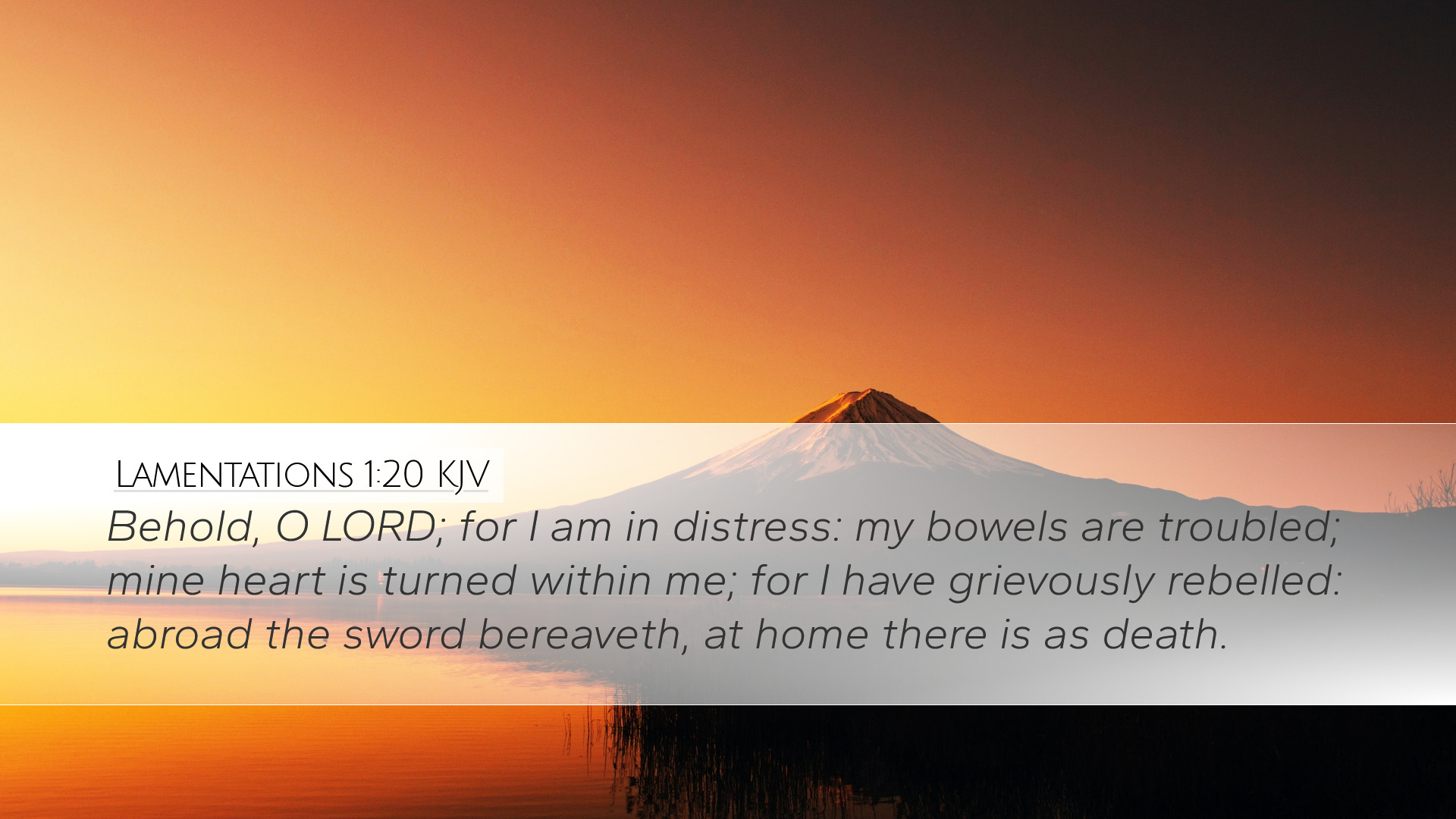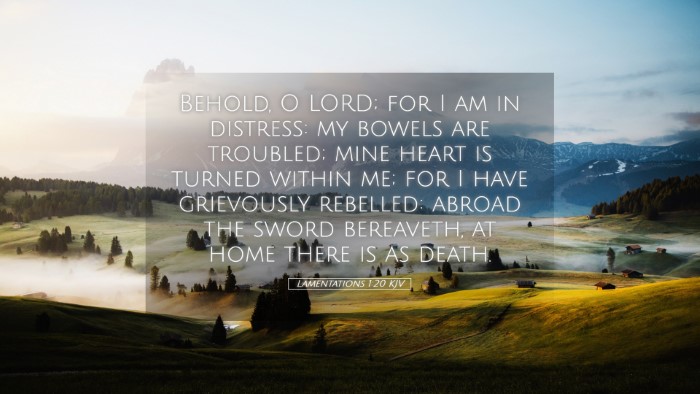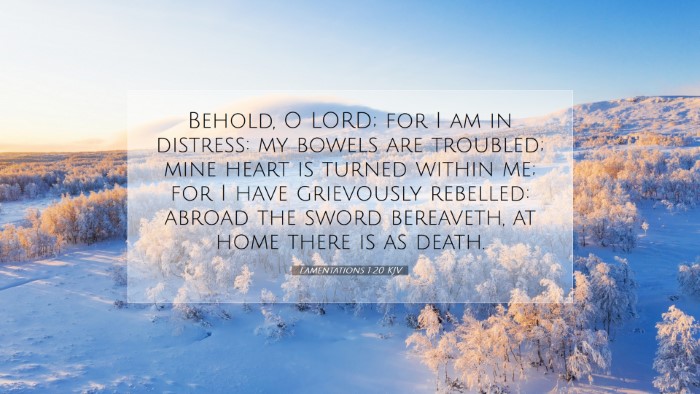Lamentations 1:20 - Bible Commentary
Lamentations 1:20 states: "See, O LORD, for I am in distress; my stomach churns; my heart is wrung within me, because I have been very rebellious. In the street the sword bears its weight; in the house, there is like death."
Overview of Lamentations
The Book of Lamentations, traditionally attributed to the prophet Jeremiah, reflects the profound sorrow and mourning of the Israelites following the devastating Babylonian siege of Jerusalem. It serves as both a national lament and a personal expression of grief. The framework of these lamentations highlights the deep emotional pain and the extent of suffering experienced by the people.
Verse Analysis
In Lamentations 1:20, the speaker, representing the collective voice of the mourning Jerusalem, cries out to the Lord. This verse embodies a deep sense of anguish, both physically and spiritually, indicating a myriad of emotions, including guilt, despair, and pleas for divine intervention.
- Distress: The phrase "I am in distress" indicates an urgent and desperate plea, reflecting the grave circumstances surrounding the speaker.
- Physical manifestations: "my stomach churns" symbolizes the intense emotional turmoil, often seen in those who face overwhelming grief or anxiety. It suggests a visceral response to suffering.
- Heartfelt confession: The mention of the heart being "wrung within me" highlights a spiritual realization of personal and communal sin. This is a critical recognition of human frailty and rebellion against God.
- Rebellion: The confession of being "very rebellious" is not only a personal admission but also a communal acknowledgment of the reasons behind their current suffering, indicating that sin has led to separation from God.
- Desperate environment: The stark imagery of the "sword" and "death" portrays the horrific realities of life amid war, capturing the sheer terror present both on the streets and within homes.
Theological Insights
This verse provides profound insights into the nature of sin and its consequences. The lament not only reveals personal suffering but also encapsulates the wider consequence of collective disobedience to God. The speaker’s call for God to "see" communicates both a hope for divine recognition and an expectation for intervention.
- The Nature of God’s Justice: The rebellion mentioned signifies a breach of covenant with God, emphasizing the importance of repentance and the consequences of sin. The theology of justice is evident here, reflecting the belief that God does not overlook sin, which ultimately leads to destruction.
- Human Suffering: The intense imagery of the physical and emotional pain points to the depths of human suffering. This acknowledgment can lead to understanding the role of suffering in God’s plan and the eventual restoration He offers.
- Intercessory Prayer: The lament serves as a model for how believers should approach God in times of grief and chaos. It exemplifies the importance of crying out to God, recognizing both personal and corporate sin, and seeking divine mercy.
Commentary from Public Domain Scholars
Matthew Henry: In his commentary, Henry emphasizes the earnestness of the speaker's plea. He suggests that the distress symbolizes not only physical afflictions and threats of violence but reflects a deeper spiritual crisis. Henry mentions that such cries are often born out of both physical and spiritual realities, and stresses the importance of turning back to God for healing.
Albert Barnes: Barnes focuses on the dual nature of suffering depicted in the verse, where personal rebellion is intertwined with the broader societal collapse. He highlights that the churning stomach and wringing heart express the weight of collective sin and the repercussions that follow. Barnes also notes that this recognition of guilt is essential for repentance and restoration.
Adam Clarke: Clarke adds a deep layer to the interpretation by examining the emotional and spiritual dimensions of the lament. He reflects on the connection between the soul's unrest and physical symptoms, illustrating the holistic view of human beings as body and spirit. Clarke highlights the urgency of turning one's heart back to God, proposing that such lamentations can lead to eventual redemption and hope.
Application for Pastors and Theologians
As contemporary church leaders and theologians grapple with issues of suffering and sin within their congregations, Lamentations 1:20 serves as a profound reminder of the importance of lament in spiritual practice. The emotional weight carried in this verse encourages a deep, honest dialogue about personal and communal sin.
- The Role of Lament: It is crucial for pastors to incorporate lament into worship, recognizing that it is an essential part of the Christian experience. Such practices can help congregants process their grief and express their anguish before the Lord.
- Teach on Repentance: Use this verse to highlight the importance of acknowledging sin in order to foster a spirit of genuine repentance that leads to restoration.
- Encourage Prayerfulness: Emphasize the need for individual and corporate prayer in times of distress, reflecting a deeper reliance on God amidst turmoil.
- Hope in Restoration: Conclude messages about this lamentation with assurance of God's mercy and the promise of restoration that follows repentance, offering hope to those in despair.
Conclusion
Lamentations 1:20 captures a poignant moment of emotional agony, underscoring the complex interplay between personal suffering, communal sin, and the need for divine intervention. Through careful theological reflection and exploration of public domain commentaries, both private individuals and church leaders can glean essential truths about the nature of grief, sin, and the hope of redemption.
The laments of the past serve not only as historical records of despair but also as vital spiritual resources, encouraging believers to turn to God in their moments of distress with honesty and faith.


